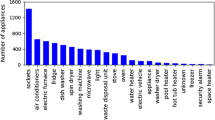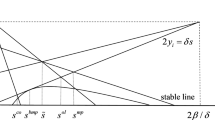Abstract
The objective of this paper is to provide a general view of the literature of applications of transferable utility cooperative games to cost allocation problems. This literature is so large that we concentrate on some relevant contributions in three specific areas: transportation, natural resources and power industry. We stress those applications dealing with costs and with problems arisen outside the academic world.
Similar content being viewed by others
References
Aadland D, Kolpin V (1998) Shared irrigation costs: an empirical and axiomatic analysis. Math Soc Sci 35:203–218
Asano H, Tsukamoto Y (1997) Transmission pricing in Japan. Util Policy 6:203–210
Audy JF, D’Amours S (2008) Impact of benefit sharing among companies in the implantation of a collaborative transportation system—an application in the furniture industry. In: Camarinha-Matos LM, Picard W (eds) Pervasive collaborative networks. IFIP international federation for information processing, vol 283, pp 519–532. Springer, Berlin
Audy JF, D’Amours S, Rousseau LM (2011) Cost allocation in the establishment of a collaborative transportation agreement: an application in the furniture industry. J Oper Res Soc 62:960–970
Azevedo F, Khodr HM, Vale ZA (2009) Transmission cost allocation using cooperative game theory: a comparative study. In: 6th international conference on the European energy market, EEM 2009
Baker M (1965) Runway cost impact study. Report presented to the Association of Local Transport Airlines, Jackson, Missouri
Baumgartner J (1997) Ordine di grandezza di alcuni costi nelle ferrovie. Ing Ferrov 7:459–469
Bhakar R, Sriram V, Padhy N, Gupta H (2009) Transmission embedded cost allocation in restructured environment: a game-theoretic approach. Electr Power Compon Syst 37:970–981
Bhakar R, Sriram V, Padhy N, Gupta H (2010) Probabilistic game approaches for network cost allocation. IEEE Trans Power Syst 25:51–58
Bialek J (1996) Tracing the flow of electricity. IEE Proc, Gener Transm Distrib 143:313–320
Bjørndal E, Stamtsis GC, Erlich I (2005) Finding core solutions for power system fixed cost allocation. IEE Proc, Gener Transm Distrib 152:173–179
Borm P, Hamers H, Hendrickx R (2001) Operations research games: a survey. Top 9:139–216
Carlsson D, Rönnqvist M (2007) Backhauling in forest transportation: models, methods, and practical usage. Can J For Res 37:2612–2623
Changjoo K (2004) Infrastructure design and cost allocation in hub and spoke and point-to-point networks. PhD thesis, Ohio State University
Curiel I (1997) Cooperative game theory and applications: cooperative games arising from combinatorial optimization problems. Kluwer Academic, Dordrecht
Davis M, Maschler M (1965) The kernel of a cooperative game. Nav Res Logist Q 12:223–259
Dinar A, Howitt R (1997) Mechanisms for allocation of environmental control cost: empirical test of acceptability and stability. J Environ Manag 49:183–203
Dinar A, Yaron D, Kannai Y (1986) Sharing regional cooperative gains from reusing effluent for irrigation. Water Resour Res 22:339–344
Driessen T (1988) Cooperative games, solutions and applications. Kluwer Academic, Dordrecht
Engevall S, Göthe-Lundgren M, Värbrand P (1998) The traveling salesman game: an application of cost allocation in a gas and oil company. Ann Oper Res 82:203–218
Engevall S, Göthe-Lundgren M, Värbrand P (2004) The heterogeneous vehicle-routing game. Transp Sci 38:71–85
Erli G, Takahasi K, Chen L, Kurihara I (2005) Transmission expansion cost allocation based on cooperative game theory for congestion relief. Int J Electr Power Energy Syst 27:61–67
Evans F, Zolezzi JM, Rudnick H (2003) Cost assignment model for electrical transmission system expansion: an approach through the kernel theory. IEEE Trans Power Syst 18:625–632
Fragnelli V, Iandolino A (2004) A cost allocation problem in urban solid wastes collection and disposal. Math Methods Oper Res 59:447–463
Fragnelli V, García-Jurado I, Norde H, Patrone F, Tijs S (2000) How to share railways infrasctructure costs? In: Patrone F, García-Jurado I, Tijs S (eds) Game practice: contributions from applied game theory. Kluwer Academic, Dordrecht, pp 91–101
Frisk M, Göthe-Lundgren M, Jörnsten K, Rönnqvist M (2010) Cost allocation in collaborative forest transportation. Eur J Oper Res 205:448–458
González-Díaz J, García-Jurado I, Fiestras-Janeiro G (2010) An introductory course on mathematical game theory. American Mathematical Society, Providence
Hoang ND (2010) Algorithmic cost allocation games: theory and applications. PhD thesis, TU Berlin
Hobbs BF, Kelly KA (1992) Using game theory to analyze electric transmission pricing policies in the United States. Eur J Oper Res 56:154–171
Ketchpel S (1995) Coalition formation among autonomous agents. In: Castelfranchi C, Müller JP (eds) From reaction to cognition. Lecture notes in computer science, vol 957. Springer, Berlin, pp 73–88
Laruelle A, Valenciano F (2008) Voting and collective decision-making. Cambridge University Press, Cambridge
Lejano R, Davos C (1995) Cost allocation of multiagency water resource projects: game theoretic approaches and case study. Water Resour Res 31:1387–1393
Lemaire J (1984) An application of game theory: cost allocation. ASTIN Bull 14:61–82
Lima DA, Contreras J, Padilha-Feltrin A (2008) A cooperative game theory analysis for transmission loss allocation. Electr Power Syst Res 78:264–275
Littlechild SC (1974) A simple expression for the nucleolus in a special case. Int J Game Theory 3:21–29
Littlechild SC, Owen G (1973) A simple expression for the Shapley value in a special case. Manag Sci 20:370–372
Littlechild SC, Owen G (1976) A further note on the nucleolus of the airport game. Int J Game Theory 5:91–95
Littlechild SC, Thompson GF (1977) Aircraft landing fees: a game theory approach. Bell J Econ 8:186–204
Loehman E, Orlando J, Tschirhart J, Whinston A (1979) Cost allocation for a regional wastewater treatment system. Water Resour Res 15:193–202
Loehman ET, Winston A (1976) A generalized cost allocation scheme. In: Stevens A, Lin Y (eds) Theory and measurement of economic externalities. Academic Press, New York, pp 87–101
Makrigeorgis CN (1991) Development of an optimal durability-based highway cost allocation model. PhD thesis, Texas A&M University
Maschler M (1992) The bargaining set, kernel, and nucleolus. In: Aumann R, Hart S (eds) Handbook of game theory with economic applications, vol 1. North Holland, Amsterdam, pp 591–667
Maschler M, Peleg B, Shapley LS (1979) Geometric properties of the kernel, nucleolus, and related solution concepts. Math Oper Res 4:303–338
Matsubayashi N, Umezawa M, Masuda Y, Nishino H (2005) A cost allocation problem arising in hub-spoke network systems. Eur J Oper Res 160:821–838
Moretti S, Patrone F (2008) Transversality of the Shapley value. Top 16:1–41
Mosquera MA, Zarzuelo JM (2008) Sharing costs in highways: a game theoretic approach. Tech Rep 78/2009, Department of Applied Economic IV, Basque Country University
Norde H, Fragnelli V, García-Jurado I, Patrone F, Tijs S (2002) Balancedness of infrastructure cost games. Eur J Oper Res 136:635–654
Okada N, Mikami Y (1992) A game-theoretic approach to acid rain abatement: conflict analysis of environmental load allocation. Water Resour Bull 28:155–162
Owen G (1977) Values for games with a priori unions. In: Henn R, Moeschlin O (eds) Mathematical economics and game theory. Springer, Berlin, pp 76–88
Özener OO, Ergun O (2008) Allocating costs in a collaborative transportation procurement network. Transp Sci 42:146–165
Pan W, Liu W, Yang Y, Li Y, Cheng L, Tang Y (2007) A nucleolus-based profit allocation method for determine individual power system stabilizer’s contribution to system stability. In: International conference on power system technology, POWERCON2006
Parrachino I, Dinar A, Patrone F (2006) Cooperative game theory and its application to natural, environmental, and water resource issues: 3. Application to water resources. Tech Rep 4074, World Bank Policy Research Working Paper Series
Patrone F, García-Jurado I, Tijs S (2000) Game practice: contributions from applied game theory. Kluwer Academic, Dordrecht
Ransmeier J (1942) The Tennessee Valley Authority: a case study in the economics of multiple purpose stream planning. Tech rep, International Institute for Applied Systems Analysis, The Vanderbilt University Press
Rudnick H, Palma R, Fernandez J (1995) Marginal pricing and supplement cost allocation in transmission open access. IEEE Trans Power Syst 10:1125–1132
Sääksjärvi M (1986) Cost allocation in cooperative wood procurement: a game theoretic approach. Stud Manag Sci 21:245–254
Schmeidler D (1969) The nucleolus of a characteristic function game. SIAM J Appl Math 17:1163–1170
Shapley LS (1953) A value for n-person games. In: Kuhn HW, Tucker AW (eds) Contributions to the theory of games, vol 2. Princeton University Press, Princeton, pp 307–317
Sánchez-Soriano J, Llorca N, Meca A, Molina E, Pulido M (2002) An integrated transport system for Alacant’s students. UNIVERCITY. Ann Oper Res 109:41–60
Songhuai D, Xinghua Z, Lu M, Hui X (2006) A novel nucleolus-based loss allocation method in bilateral electricity markets. IEEE Trans Power Syst 21:28–33
Sood YR, Padhy NP, Gupta HO (2002) Wheeling of power under deregulated environment of power system—a bibliographical survey. IEEE Trans Power Syst 17:870–878
Stamtsis GC, Erlich I (2004) Use of cooperative game theory in power system fixed-cost allocation. IEE Proc, Gener Transm Distrib 151:401–406
Straffin PD, Heaney JP (1981) Game theory and the Tennessee Valley Authority. Int J Game Theory 10:35–43
Suzuki M, Nakayama M (1976) The cost assignment of the cooperative water resource development: a game theoretical approach. Manag Sci 22:1081–1086
Tan X, Lie TT (2002) Application of the Shapley value on transmission cost allocation in the competitive power market environment. IEE Proc, Gener Transm Distrib 149:15–20
Thompson G (1971) Airport costs and pricing. PhD thesis, University of Birmingham
Thomson W (2003) Axiomatic and game-theoretic analysis of bankruptcy and taxation problems. Math Soc Sci 45:249–297
Tijs S (1981) Bounds for the core and the τ-value. In: Moeschlin O, Pallaschke D (eds) Game theory and mathematical economics. North Holland, Amsterdam, pp 123–132
Tijs S, Driessen T (1986) Game theory and cost allocation problems. Manag Sci 32:1015–1028
Tsukamoto Y, Iyoda I (1996) Allocation of fixed transmission cost to wheeling transactions by cooperative game theory. IEEE Trans Power Syst 11:620–629
van Damme E, Furth D (2002) Game theory and the market. In: Borm P, Peters H (eds) Chapters in game theory. Kluwer Academic, Dordrecht, pp 51–81
Vázquez-Brage M, van den Nouweland A, García-Jurado I (1997) Owen’s coalitional value and aircraft landing fees. Math Soc Sci 34:273–286
Villarreal-Cavazos A, García-Díaz A (1985) Development and application of new highway cost allocation procedures. Transp Res Rec 1009:34–45
Villasana R, Garver LL, Salon SJ (1985) Transmission network planning using linear programming. IEEE Trans Power Appar Syst 104:349–356
Wood AJ, Wollenberg BF (1996) Power generation, operation, and control. Wiley, New York
Xie J, Bai X, Gan D, Zhang G (2008) Quantification and allocation of peaking costs of hydro-thermal power systems. In: IEEE power and energy society 2008 general meeting: conversion and delivery of electrical energy in the 21st century. PES
Young H (1994) Cost allocation. In: Aumann R, Hart S (eds) Handbook of game theory with economic applications, vol 2. North Holland, Amsterdam, pp 1193–1235
Young H, Okada N, Hashimoto T (1982) Cost allocation in water resources development. Water Resour Res 18:463–475
Yu CW, David AK, Wong YK (2001) The use of game theory in transmission embedded cost allocation. In: 5th international conference on advances in power system control, operation and management, pp 139–143
Yu CW, David AK, Tse CT, Chung CY (2003) Capacity-use and reliability-based transmission embedded cost allocation with temporal considerations. Int J Electr Power Energy Syst 25:201–208
Zara S, Dinar A, Patrone F (2006) Cooperative game theory and its application to natural, environmental, and water resource issues: 2. Application to natural and environmental resources. Tech Rep 4073, World Bank Policy Research Working Paper Series
Zolezzi J, Rudnick H (2003) Consumers coordination and cooperation in transmission cost allocation. In: Power tech conference proceedings, 2003 IEEE Bologna, vol 3
Zolezzi JM, Rudnick H (2002) Transmission cost allocation by cooperative games and coalition formation. IEEE Trans Power Syst 17:1008–1015
Author information
Authors and Affiliations
Corresponding author
Additional information
This invited paper is discussed in the comments available at doi:10.1007/s11750-011-0202-z, doi:10.1007/s11750-011-0203-y, doi:10.1007/s11750-011-0204-x and doi:10.1007/s11750-011-0205-9.
Rights and permissions
About this article
Cite this article
Fiestras-Janeiro, M.G., García-Jurado, I. & Mosquera, M.A. Cooperative games and cost allocation problems. TOP 19, 1–22 (2011). https://doi.org/10.1007/s11750-011-0200-1
Published:
Issue Date:
DOI: https://doi.org/10.1007/s11750-011-0200-1




